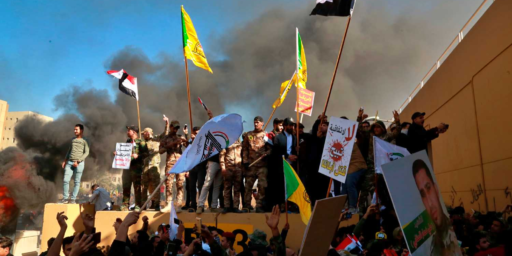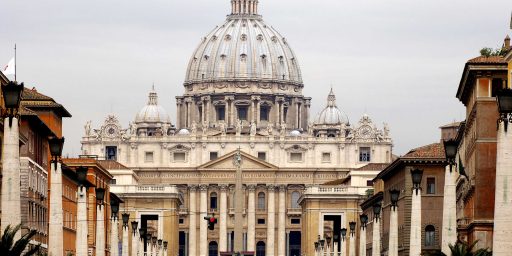U.S. Embassy in Iraq to be Biggest, Most Expensive, Ever
The almost-complete U.S. Embassy in Iraq is a sight to behold.
The new U.S. Embassy in Baghdad will be the world’s largest and most expensive foreign mission, though it may not be large enough or secure enough to cope with the chaos in Iraq. The Bush administration designed the 104-acre compound — set to open in September in what today is a war zone — to be an ultra-secure enclave. Yet it also hoped that downtown Baghdad would cease being a battleground when diplomats moved in.
Over the long term, depending on which way the seesaw of sectarian division and grinding warfare teeters, the massive city-within-a-city could prove too enormous for the job of managing diminished U.S. interests in Iraq. The $592 million embassy occupies a chunk of prime real estate two-thirds the size of Washington’s National Mall, with desk space for about 1,000 people behind high, blast-resistant walls. The compound is a symbol both of how much the United States has invested in Iraq and how the circumstances of its involvement are changing.
The embassy is one of the few major projects the administration has undertaken in Iraq that is on schedule and within budget. Still, not all has gone according to plan. The 21-building complex on the Tigris River was envisioned three years ago partly as a headquarters for the democratic expansion in the Middle East that
President Bush identified as the organizing principle for foreign policy in his second term. The complex quickly could become a white elephant if the U.S. scales back its presence and ambitions in Iraq. Although the U.S. probably will have forces in Iraq for years to come, it is not clear how much of the traditional work of diplomacy can proceed amid the violence and what the future holds for Iraq’s government.
To put it mildly. Aside from the unlikelihood of this behemoth serving as the epicenter for managing relations with a democratic Middle East any time soon, the very idea of this is monumentally stupid. Its very existence helps undermine the good relations we’re trying to build. Surely, a permanent, armed mini-city can not instill much confidence in the average Iraqi that we think of ourselves as something other than colonial overlords.






Of course, after either Senator Clinton or Obama are elected, it will have to be abandon as the U.S. pulls out of Iraq and leaves them to themselves.
I think this is the most discouraged I’ve seen you.
“Chaos” in Iraq? I thought that was what was going to happen if we “surrender”, you know one of the reasons our guys have to say and die there…
Its fascinating, in a sad sort of way, to watch Bush’s supporters trying to inch away from him and his train wreck policies…
That would be awesome! Alas, I don’t think either one of them has the courage to withdraw, or even, really, the inclination. We might have more luck with Obama than Clinton, who remains the most stubbornly pro-war of the Dem candidates.